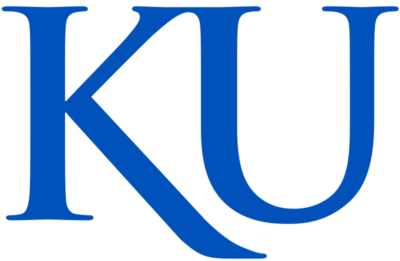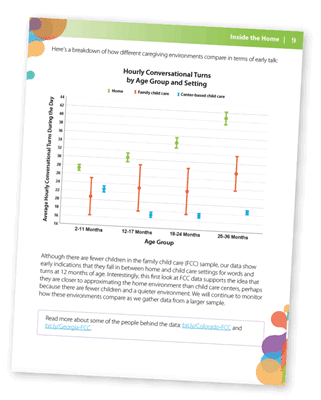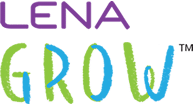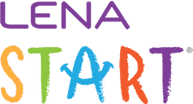LENA for University-Community Partnerships
Universities across the country are partnering with LENA.
They're seeing impactful research results and community benefits.
In its earliest years, LENA partnered extensively with universities and clinical researchers around the world to assess and validate our technology.
As LENA became the global standard for measuring early language environments, our focus has shifted to our founders’ original goal of putting that actionable and objective feedback into the hands of parents, teachers, and caregivers. Universities continue to be important partners, both in research settings as well as in delivering community-based programming.
University partners have found that, through LENA programs, they can take their research findings and turn them into action within their surrounding community, while also continuing to produce quantifiable outcomes and data to help them better understand how to support children, families, and teachers.
LENA programs also provide an opportunity to build partnerships with other local stakeholders and for students and faculty to get hands-on experience.
Here are a few examples of how universities have brought LENA programs to their communities:

At Iowa State University, associate professor Dr. Constance Beecher and graduate research assistant Craig Van Pay partnered with local libraries and the ISU Extension Office to bring LENA Start to the community.
To investigate whether the program increased adult word count, conversational turn count, and child language development, the team compared outcomes for families who attended LENA Start with a comparison group of families who attended story time at a local library regularly. The participants were closely matched between the intervention and comparison groups to have similar income, ethnicity, and baseline talk levels. The data demonstrated that families in LENA Start grew in talk and conversational turns significantly more than families who just attended the library or library programs.

Dr. Reem Khamis-Dakwar is a professor of Speech Language Pathology and director of the Neurophysiology in Speech-Language Pathology Lab at Adelphi University. While investigating language assessment in Arabic-speaking children in the United States, she implemented LENA Start to provide parents from minority communities with training and support so that they can maintain continued exposure to both of the child’s languages, facilitating language growth and learning.

Researchers with Kansas University's Juniper Gardens Children's Project partnered with LENA to assess two important components of LENA Grow: teacher satisfaction and child outcomes. They found impressive results with both.
Teachers reported that the program’s data-based coaching helped them to set and reach goals in their classrooms. Their efforts to improve classroom quality appear to have positively affected the children in their care: 82% of children in LENA Grow classrooms were assessed to be “on track” in their expressive language abilities at the end of the program compared to just 38% of a comparison group.

A tightly knit network of organizations works in concert to increase equitable opportunity and improve kindergarten readiness and long-term outcomes in Memphis. Dr. Loretta Rudd, a clinical associate professor and program coordinator in the Child Development and Family Studies Department at the University of Memphis, spearheaded a project to make LENA an important part of that network. Dr. Ludd secured support from the Urban Child Institute and helped a number of organizations implement LENA programs, including Le Bonheur Children’s Hospital, Agape Child and Family Services, and Porter-Leath.

In the University of the Pacific's home city of Stockton, California, only 35% of third graders were assessed as proficient readers in 2017. The university's president challenged her community relations team, led by director Mike Klocke, to convene a coalition to implement its LENA programs. By early 2018, the university had partnered with First 5 San Joaquin to help the County Office of Education and the Stockton-San Joaquin Public Library to launch the LENA programs. To date, over 1,000 families have been impacted by the program.
We’ve made a lifetime difference in the lives of these families and children by creating an opportunity for them to make a daily habit of using talk and being with their children.
— Dr. Constance Beecher, Associate Professor, Iowa State University
We now know that teachers who engaged in LENA Grow found that coaching and feedback based on LENA data to be meaningful and that children in their classrooms showed increases in their expressive language skills — a change not seen in programs that didn’t employ LENA Grow.
— Dr. Judy Carter, Senior Scientist, Kansas University
LENA talks a lot about the benefits of increasing language with children, but we know that when we affect development in one area, we affect development in every area. I feel like LENA fits perfectly with a focus on social and emotional development.
— Dr. Loretta Rudd, Clinical Associate Professor, University of Memphis, Tennessee
With LENA Start, families are empowered to value their native languages and maintain them across generations. Our work must always be centered around the targeted families and their children within a strengths-based approach. We can attempt to do this by facilitating parents’ meaningful participation across language policy, pedagogy, and practice.
— Dr. Reem Khamis-Dakwar, Professor, Adelphi University, New York

There's a critical need for increased early talk — right now
There's a wide gap between the number of conversational turns children experience in home settings and center-based child care settings. This is according to Inside Early Talk, the latest report from LENA’s research team. Alarmingly, 20% of children spend large portions of their day in language isolation, and children experience the least amount of talk when they need it most.
But there's hope.
Every increase of two conversational turns per hour in a child's first years correlates to an increase of one IQ point in adolescence. LENA Grow is designed to deliver those increases.
Improving language environments is such a relatively straightforward solution, but we know that people can't change what they don't measure. LENA's "talk pedometer" technology delivers the measurements, and LENA Grow's data-driven coaching encourages positive change.
Interested in learning more about bringing LENA to your community?
Or send us an email.










